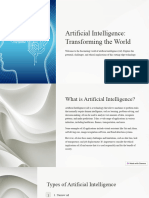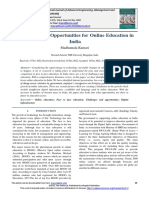0% found this document useful (0 votes)
15 views8 pagesThe Rise of Artificial Intelligence
Artificial intelligence (AI) is rapidly evolving, significantly impacting various sectors and projected to reach a $1.81 trillion market by 2030. Key concepts include machine learning, deep learning, and types of AI such as narrow, general, and super AI, with applications in everyday life and industries like healthcare and finance. Ethical considerations, future advancements, and the importance of responsible development are crucial as society embraces the AI revolution.
Uploaded by
solomon odukoCopyright
© © All Rights Reserved
We take content rights seriously. If you suspect this is your content, claim it here.
Available Formats
Download as PPTX, PDF, TXT or read online on Scribd
0% found this document useful (0 votes)
15 views8 pagesThe Rise of Artificial Intelligence
Artificial intelligence (AI) is rapidly evolving, significantly impacting various sectors and projected to reach a $1.81 trillion market by 2030. Key concepts include machine learning, deep learning, and types of AI such as narrow, general, and super AI, with applications in everyday life and industries like healthcare and finance. Ethical considerations, future advancements, and the importance of responsible development are crucial as society embraces the AI revolution.
Uploaded by
solomon odukoCopyright
© © All Rights Reserved
We take content rights seriously. If you suspect this is your content, claim it here.
Available Formats
Download as PPTX, PDF, TXT or read online on Scribd
/ 8





























































































